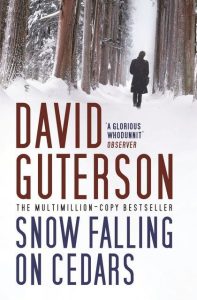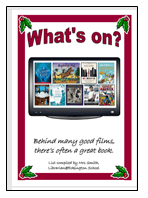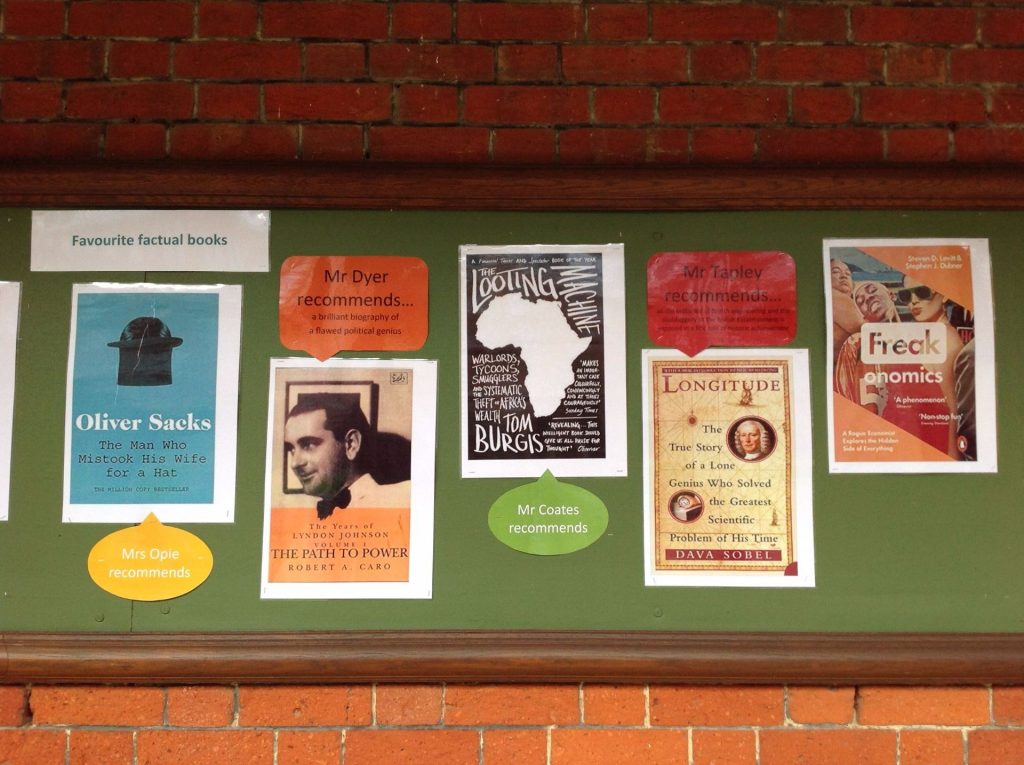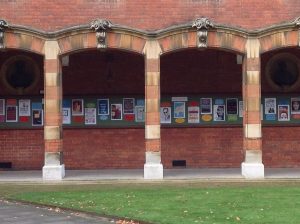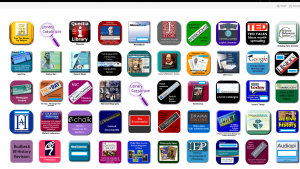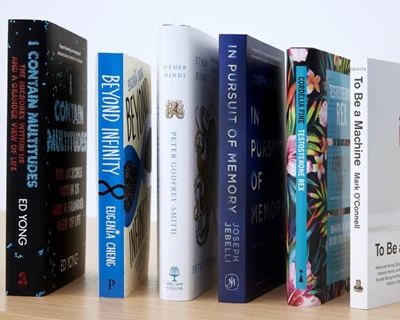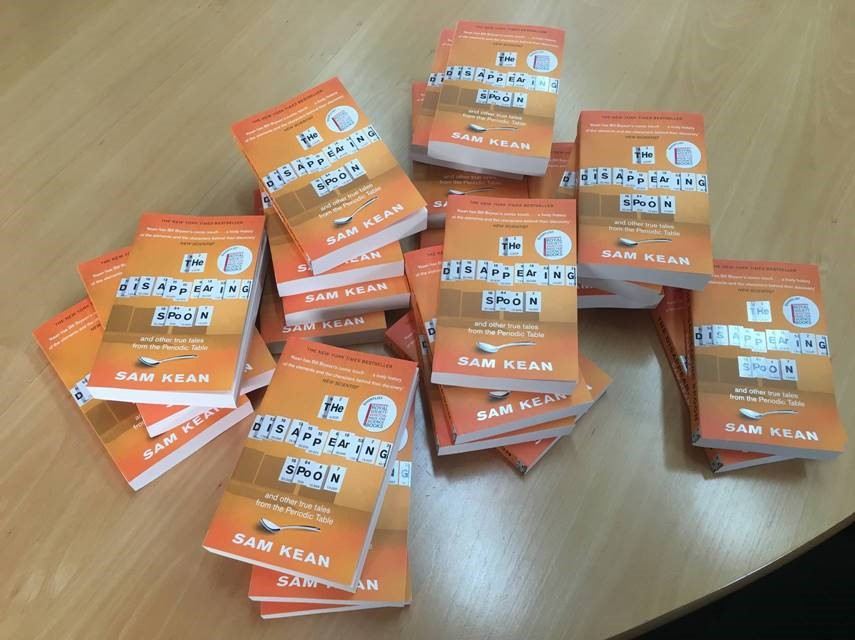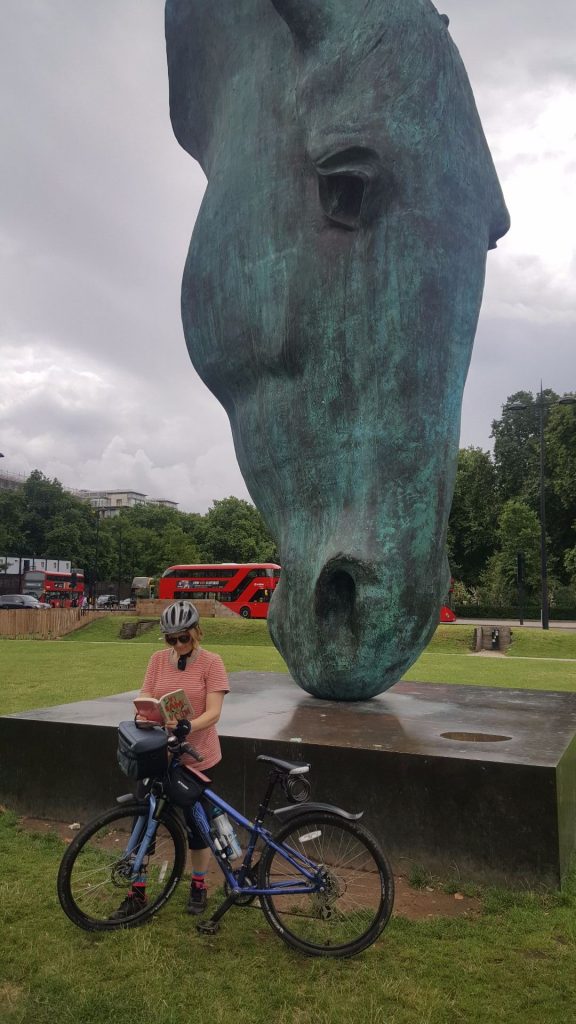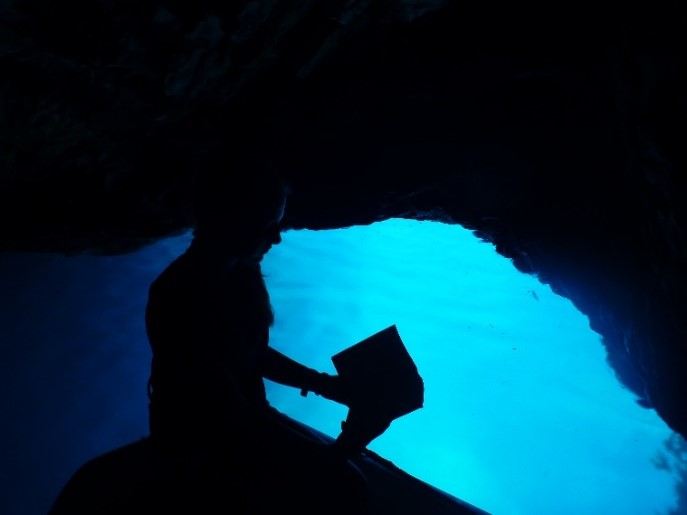Here is the remainder of the enormous list of favourite books we collected in our ‘Wellington College Big Book Vote’ in March this year to coincide with World Book Day.
As we head towards the long summer holiday it seemed an apt time to reveal all the books which received one recommendation from a staff member or student – nearly 500 in total.
Apologies for the incomplete nature of the information – not all voters supplied authors or full titles but for the time being it is an intriguing and wide ranging list of personal favourites!
100 Years of Solitude by Gabriel Garcia Marquez |
| 11 Kinds of Loneliness – by Richard Yates |
| 41: A Portrait of My Father (George W. Bush) |
| A brief history of time |
| A Christmas Carol (Charles Dickens) |
| A court of thorns and roses by Sarah J Maas |
| A Fine Balance by Mistry |
| A Gathering Light by Jennifer Donnelly |
| A god in ruins by Kate Atkinson |
| A heartbreaking work of staggering genius – Dave Eggers |
| A History of the World in 100 Objects (Neil McGregor) |
| A Little Life |
| A million little pieces |
| A Murder of Quality (John Le Carre) |
| A People’s Tragedy by Orlando Figes |
| A Room with a View, E.M. Forster |
| A Separate Peace |
| A Study in Scarlet |
| A tale of two Cities |
| A Town Like Alice |
| A Year of Marvellous Ways (Sarah Winman, an old friend) |
| About a boy – Nick Hornby |
| Absurdistan by Gary Shteyngart |
| Aeneid |
| Aesop’s Fables |
| Alan Bennett Diaries – Keep on Keeping on |
| Alan Turing and the Turing machine |
| Alex Cross |
| Alice’s Adventures in Wonderland, Lewis Carroll |
| All My Secrets |
| All the Bright Places- Jennifer Niven |
| All the truth that’s in me |
| Altered Pasts: Counterfactuals in History |
| Am I normal yet? |
| American Gods – Neil Gaiman |
| Americanah – Chimamanda Ngozi Adichie |
| An abundance of Katherine’s |
| An unsuitable job for a woman – PD James |
| Andre Agassi autobiograpy |
| Angels and Demons by Dan Brown |
| Antony Beevor, Berlin the Downfall |
| Apple and Rain by Sarah Crossan |
| Arabian Sands, by Wilfred Thesiger |
| Archangel: Robert Harris |
| Around the world in 80 days, Jules Vernes |
| As I Lay Dying |
| Assassin’s Apprentice |
| Augustus- Allan Massie |
| Auschwitz by Miklaos Nyiszli |
| Bad Pharma – Ben Goldacre |
| Ballet shoes |
| Between Shades of Gray by Ruta Sepetys |
| Between the World and Me (Ta-Nehisi Coates) |
| Beware of Pity – Stefan Zweig |
| Beyond Good and Evil |
| Beyond the Deepwoods |
| Black Box Thinking (Matthew Syed) |
| Black Water Lillies – Michel Bussi |
| Blankets |
| Blood Meridian |
| Born to be wild |
| Bounce |
| Brighton Rock, Graham Green |
| Britons: Forging a Nation by Linda Colley |
| Broken |
| Buffering |
| Bunker Diary – Kevin Brooks |
| Casino Royale |
| Charlie and the chocolate factory |
| Chickenhawk – unknown |
| Child 44 |
| Churchill Factor |
| Cinnamon Shops – Bruno Schulz |
| Collected Poems 1909-1962, by T S Eliot |
| Collected Poems of Wallace Stevens |
| Collected Poems, by Philip Larkin |
| Cuckoo’s Calling by J.K.Rowling |
| Danny the Champion of the World – RD |
| Daphne du Maurier – Jamaica Inn |
| Daring greatly |
| Death In The Afternoon by Ernest Hemingway |
| Death Note |
| Death of a Naturalist by Seamus Heaney |
| Department 19 series by Will Hill |
| Desire |
|
| Dick Francis’s collection |
| Dirk Gently’s Holistic Detective Agency by Douglas Adams |
| Diving Adventure – Willard Price |
| Diving Bell and the Butterfly – Jean-Dominique Bauby |
| Don Kişot |
| Dulce et Decorum Est |
| Earthfall |
| Earth’s Children series (6 books) by Jean M Auel |
| Eat Sweat Play: How sport can change our lives – Kessel |
| Economix – graphic novel explaining Economics |
| Edge of nowhere |
| Edmund Spenser, The Faerie Queene |
| El principito – Antoine de Saint-Exupery |
| Emma (JAusten) |
| Empire of Storms by Sarah J Maas |
| Empire, by Michael Hardt and Antonio Negri |
| Empress Orchid (Anchee Min) |
| Ender’s Game |
| Engleby – Sebastian Faulks |
| Enigma, Robert Harris |
| Escape by Kate Cann |
| Everyday |
| Falling Leaves (Adeline Yen Mah) |
| Famous Five by Enid Blyton |
| Farseer Trilogy |
| Fatherland – Robert Harris |
| Fiction – The count of Monte Cristo – Dumas |
| Fight like a girl |
| Find her |
| First Test (Tamora Pierce) |
| Fluke – Joseph Mazur |
| Fragments of Sappho |
| Freedom (Jonathan Franzen) |
| General Prologue to the Canterbury Tales – Chaucer |
| Genesis |
| Geoffrey Chaucer, The Canterbury Tales |
| Gilead by Marilynne Robinson |
| Girl online |
| Gone with the Wind |
| Good Omens’ by Terry Pratchett and Neil Gaiman |
| Goodbye to All That – Robert Graves |
| Goosebumps – Ghost Camp |
| Green Eggs & Ham – Dr Seuss |
| Green Flag by Robert Kee |
| Gustav Heningsen, The Witches Advocate, Basque Witchcraft and the Spanish Inquisition |
| Half Hidden |
| Hamlet, by William Shakespeare |
| Happiness by design |
| Heidi |
| Heir of fire by Sarah j Maas |
| Here we lie |
| Hidden Killer – Lynda La Plante |
| Hiroshige |
| History as an Art of Memory – Patrick Hutton |
| History of God – Karen Armstrong |
| Hitler and Stalin: Parallel Lives – Alan Bullock |
| Hokusai |
| Holding Up the Universe- Jennifer Niven |
| Hope in a ballet shoe |
| House Rules, Jodi Picoult |
| House with the Green Shutters |
| How To Be A Study Ninja by Graham Alcott |
| How to Watch Football by Ruud Gullit |
| Hunt for the wilderpeople |
| I am Malala |
| I, Claudius |
| I Coriander |
| Illustrated Encyclopedia of British History |
| In Cold Blood – Truman Capote |
| In the heart of the sea |
| In the killing woods |
| Into that forest |
| Introducing Quantum Physics – A Graphic Novel |
| Is it just me? By Miranda Hart |
| Itch – Simon Mayo |
| It’s kind of a funny story |
| It’s Quacking Time |
| J G Farrell, The Siege of Krishnapur |
| Jack Reacher |
| Jeffery Archor books |
| Jessica Ennis biography |
| John Bunyan’s The Pilgrim’s Progress |
| John Milton, Paradise Lost |
| John: The Gospel of Wisdom by Michael Card |
| Johnny Be Good by Paige Toon |
| Journey to the river sea |
| Journey’s End |
| Jung Chang- Wild Swans |
| Jurassic Park |
| Kafka on the Shore, by Haruki Murakami |
| Kane and Abel |
| Ketchup Clouds |
| King Richard III by William shakespeare |
| King Soloman’s Mines’ by H. Rider Haggard |
| Kreutzer Sonata – Tolstoy |
| La fille d’un héros de l’URSS (Andreii Makeine) |
| La Lionne Blanche, Henning Mankell |
| La verite sur l’affaire Quebert, Joel Dicker |
| Lady chatterley’s Lover |
| Lamentation- C.J.Samson |
| Lanark – Alastair Gray |
| Landmarks |
| L’Arrache Coeur, Boris Vian |
| Last Train to Babylon by Charlee Fam |
| Les animaux denatures, Vercos |
| Letter To the King: Tonke Dragt |
| Life’s Too Short by Helen Rollason |
| Little Women, L.M. Alcott |
| London Orbital – Iain Sinclair |
| Longbourn by Jo Baker |
| Lorein Legacys |
| Lost and Found |
| Lost at sea: the jon ronson mysteries |
| Lost Japan |
| Love Does Bob Goff |
| Love in the Time of Cholera |
| Lustrum by Robert Harris |
| M Train – Patti Smith |
| Magic in Numberland – Alex Bellos |
| Mallory Towers series |
| Mao’s Last Dancer |
| Mapp and Lucia (EFBenson) |
| Margaret Brown’s Goodnight Moon |
| Marley and Me |
| Mary Shelley, Frankenstein |
| Matilda |
| Maus, by Art Spiegelman |
| Meditations (Marcus Aurelius) |
| Memoirs of a Geisha |
| Miss Pettigrew Lives for the Day |
| Molecules at an Exhibition |
| Molecules, Peter Atkins |
| Monet |
| Moonfleet |
| Mortal Engines |
| Most of the Kay Scarpetta books by Patricia Cornwell |
| Muhammad Ali – Autobiography |
| murder |
| My sister lives on the mantlepiece |
| My sword hand is singing |
| Nerve |
| Never Let Me Go |
| Night Runner by Tim Bowler |
| Not in God’s Name |
| Not without my daughter |
| Numbers |
| Odyssey |
| On Beulah Height – Reginald Hill |
| On Chesil Beach – Ian McEwan |
| On politics |
| One Day Event – Josephine Pullein-Thompson |
| One Day in the Life of Ivan Denisovich (Aleksandr Solzhenitsyn) |
| One-Inch Warrior |
| Oscar and Lucinda’ by Peter Carey |
| Out of my mind |
| Paradise Lost |
| Paul Krugman- End this depression now |
| Paul O’Connell (The Battle) book on Rugby |
| Peacemakers |
| Perks of Being a Wallflower |
| Persepolis – Marjane Satrapi |
| Persian Fire |
| Persuasion |
| Peter Rabbit |
| Phaedrus (Plato) |
| Pickwick Papers by Charles Dickens |
| Polar Bear Pirates and the quest for Fat City (Adrian Webster) |
| Pompeii – Robert Harris |
| Prodigal’s daughter |
| Provided You Don’t Kiss Me: 20 Years with Brian Clough – Duncan Hamilton |
| Psion |
| Purity |
| Queen of the desert by Georgina Howell |
| Red Rising – Pierce Brown |
| Requiem for a Dream |
| Ring of bright water by Gavin Maxwell |
| Robinson Crusoe |
| Roll of thunder hear my cry |
| Rudyard Kipling – IF |
| Scoop by Evelyn Waugh |
| Serving the Reich: The Struggle for the Soul of Physics under Hitler |
| Shadow and Bone – Leigh Bardugo |
| Shakespeare by Bill Bryson |
| Short History of nearly everything-Bill Bryson |
| Silly Verse for Kids Spike Milligan |
| Silver linings playbook |
| Sir Thomas Malory, Morte Darthur |
| Sister |
| Sister missing |
| Six Dinner Sid – Inga Moore |
| Six Not So Easy Pieces by Richard Feinman |
| Six Poets, Alan Bennett |
| Sleep in early modern England- Sascha handley |
| Smart – Kim Slater |
| Solitaire Mystery by Jostein Gaarder |
| Squash and a Squeeze – Julia Donaldson |
| Stalingrad by Anthony Beevor |
| Stick Man |
| Stoner – by John Williams |
| Storm Catchers |
| Stuff Matters’ by Mark M |
| Summer of ’49 – David Halberstam |
| Survivor by Chuck Palahniuk |
| Sway: The Irresistible Pull of Irrational Behavior |
| T S Eliot, Selected Poems |
| Tarzan of the Apes – Edgar Rice-Burroughs |
| Taxi – Karen Duve |
| Team of Rivals: the political genius of Abraham Lincoln – Doris Kearns Goodwin |
| Temperance Brennan (Bones) books by Kathy Reichs |
| Tender is the Night – by F. Scott Fitzgerald |
| The graveyard book – Neil Gaiman |
| The 100 dollar horse |
| The 48 laws of power |
| The adventures of Paddington, Michael Brown |
| The Alchemist by Paulo Coelho |
| The Annals – Tacitus |
| The Art of Meditation, by Matthieu Ricard |
| The Baroque Cycle (Neal Stephenson) |
| The Beastly Beatitudes of Balthazar B |
| The BFG – Roald Dahl |
| The Big Necessity – Rose George |
| The Birth of the Pill |
| The Borrowers by Mary Norton |
| The Boy At The Top of The Mountain |
| The Boy with the Lightning Feet |
| The Bricks That Built The Houses |
| The Butterfly lion |
| The Call of the Wild – Jack London |
| The Confessions of an Economic Hitman |
| The Count of Monte Cristo |
| The Crossing |
| The Dark is Rising (Susan Cooper) |
| The Dark Knight Returns |
| The Day of the Jackal |
| The Dead |
| The Disappearing Spoon |
| The Economics of Good and Evil |
| The Ego and its Own – Max Stirner |
| The empty pot |
| The Essex Serpent by Sarah Perry |
| The fastest boy in the world |
| The fifteen lives of Harry August |
| The Fifth Elephant – Terry Pratchett |
| The Fight – Norman Mailer |
| The garden of evening mists |
| The Girls by Emma Cline |
| The Giving Tree (Shel Silverstein) |
| The glass castle |
| The Glass Menagerie, Tenessee Williams |
| The Glass Palace by Amitav Ghosh |
| The God Delusion – Richard Dawkins |
| The good earth |
| The Grace to Race by Sister Madonna Buder |
|
| The Hand That First Held Mine |
| The Handmaid’s Tale Margaret Attwood |
| The Help by Kathryn Stockett |
| The House of the Scorpion |
| The Hundred year old man who climbed out of a window and disappeared – Jonas Jonasson |
| The Hungry Caterpillar |
| The Iliad |
| The Immortal Life of Henrietta Lacks |
| The invention of Wings |
| The Japanese Mind |
| The Last Enemy |
| The Last of the Wine – Mary Renault |
| The Last Temptation (Nikos Kazantzakis) |
| The liar |
| The lie |
| The lies we tell ourselves – Robin Talley |
| The life-changing magic of tidying by Marie Kondo |
| The Lightless Sky – Gulwali Passerlay |
| The Line of Beauty – Alan Hollinghurst |
| The Little Drummer Girl John Le Carre |
| The Locust Effect (Gary Haugen) |
| The Loney |
| The Long Walk |
| The Magic Faraway Tree by Enid Blyton |
| The Man Who Mistook His Wife For a Hat (Oliver Sacks) |
| The messenger bird |
| The Miniaturist, Jessie Burton |
| The moaning of life – Karl pilkington |
| The Mortal Instrument Series by Cassandra Clare |
| The Mysterious Haunting of Charity Delafield |
| The Nicomachean Ethics |
| The Night Rainbow |
| The Number Devil |
| The Ocean At the End of the Lane- Neil Gaiman |
| The Odyssey: Homer |
| The One and Only Ivan |
| The Outsider |
| The Painter of Shanghai (Jennifer Cody Epstein) |
| The Palliser Novels (6) – Anthony Trollope |
| The Particle at the End of the Universe |
| The Penguin History of Latin America |
| The pill |
| The Pit and the Pendulum – Edgar Allan Poe (do short stories count?) |
| The Poisonwood Bible |
| The Princess Bride |
| The Prophet, by Khalil Gibran |
| The Quiet American Graeme Green |
| The Railway Children |
| The Reader, Bernard Schlink |
| The rest of us just live here |
| The Restless Earth Nigel Calder |
| The Rise and Fall of the Great Powers |
| The Rise and Fall of the Third Reich – William L.Shirer |
| The Road by Cormac McCarthy |
| The Roman Revolution’ by Ronald Syme |
| The Romanovs by Simon Montefiore |
| The school for good and evil |
| The Scotland Street Series – Alexander McCall-Smith |
| The Screwtape Letters, by C S Lewis |
| The sea of tranquility |
| The secret life of bees |
| The Secret of Atlantis – Otto Muck |
| The Secret Race by Tyler Hamilton |
| The Shack by Wm. Paul Young |
| The Shock Doctrine |
| The Silver Sword |
| The Sky is Everywhere |
| The Space Race by Deborah Cadbury |
| The Spy Who Came In From The Cold by John Le Carre |
| The State We’re In |
| The Swiss Family Robinson Johann David Wyss |
| The Tales of Beedle the Bard – JK Rowling |
| The Tenant of Wildfell Hall by Anne Bronte |
| The Things They Carried |
| The Third Reich |
| The Thornbirds – Colleen McCullough |
| The time machine (H.G. Wells) |
| The Trial – Kafka |
| The Trouble with Physics |
| The Universe versus Alex Woods – Gavin Extence |
| The Valley of Adventure – Enid Blyton |
| The War Of Don Emmanuel’s Nether Parts – Louis de Bernieres |
| The Wealth and Poverty of Nations (David Landes) |
| The Weapons Shops of Isher – A E Van Vogt |
| The White Spider – Heinrich Harrer |
| The Why Cafe, John Strelecky |
| The Wind in the Willows |
| The witch craze- Lyndal roper |
| The World According to Bob – James Bowen |
| The Worldly Philosophers |
| The Years of Lyndon Johnson (4 vols) – Robert Caro |
| Thief by Malorie Blackman |
| Thinking, Fast and Slow (Daniel Kahneman) |
| Thirteen Reasons Why – Jay Asher |
| Three Cups of Tea |
| Thus Spoke Zarathustra |
| Time of Gifts |
| Touching the void |
| Trainspotting – Irvine Welsh |
| Trapped series |
| Trash – Andy Mulligan |
| Treasures of the snow |
| Trump on Trump |
| Trust in me |
| Tuesdays with Morrie by Mitch Albom |
| Unreliable memoirs by Clive James |
| Varjack Paw – SF Said |
| Vicious by Victoria Schwab (it’s fantastic, please put it in the library) |
| Wabi sabi |
| Wallander Series (Henning Mankell) |
| War Music (Christopher Logue) |
| Watership Down – Richard Adams |
| We are all made of molecules |
| We Were Liars- E. Lockhart |
| What is the what |
| What milo saw |
| Where Are the Children by Mary Higgins Clark |
| Where Rainbows End, Cecilia Ahern |
| Where’d You Go Bernadette? by Maria Semple |
| White dolphin |
| Who’s afraid of Virginia Woolf? |
| Why Do Chemical Reactions Happen: Peter Wothers and James Keeler |
| Why Leaders Eat Last |
| Winnie the pooh, AA Milne |
| Wolf Hall – Hilary Mantel |
| Wolfgang Schivelbusch’s The Culture of Defeat |
| Woman in White by Wilkie Collins |
| You by Caroline Kepnes |
| Young Samurai series |
| Zen and the Art of Motorcycle Maintenance, by Robert M. Pirsig |
| Flambards series K.M Peyton |
| Of Love and Shadows by Isabel Allende |
| The Rosie Project |
| The Code of the Woosters |
| The Magic Mountain |
| Barchester Towers |
| Middlemarch |
| The miracles of Santo Fico by D L Smith |
| Georgiana, Duchess of Devonshire by Amanda Foreman |
| The sword in the stone by T H White |
| The moonstone by Wilkie Collins |
| Bel Canto by Ann Patchett |
| Five Minutes Peace by Jill Murphy |
| Alone in Berlin |
| On the Road – Jack Kerouac |
| Avocado Baby |
| Miles: The Autobiography – Miles Davis |
| Hit Me, Fred – Fred Wesley |
| The Glass Bead Game – Hermann Hesse |
| Draplin Design Co. Pretty Much Everything – Aaron James Draplin |
| Colony of Thieves |
| This Thing of Darkness |
| Thousand Splendid Suns |
| Everything Everything |
| Pollyanna |
| Young James Bond series |
